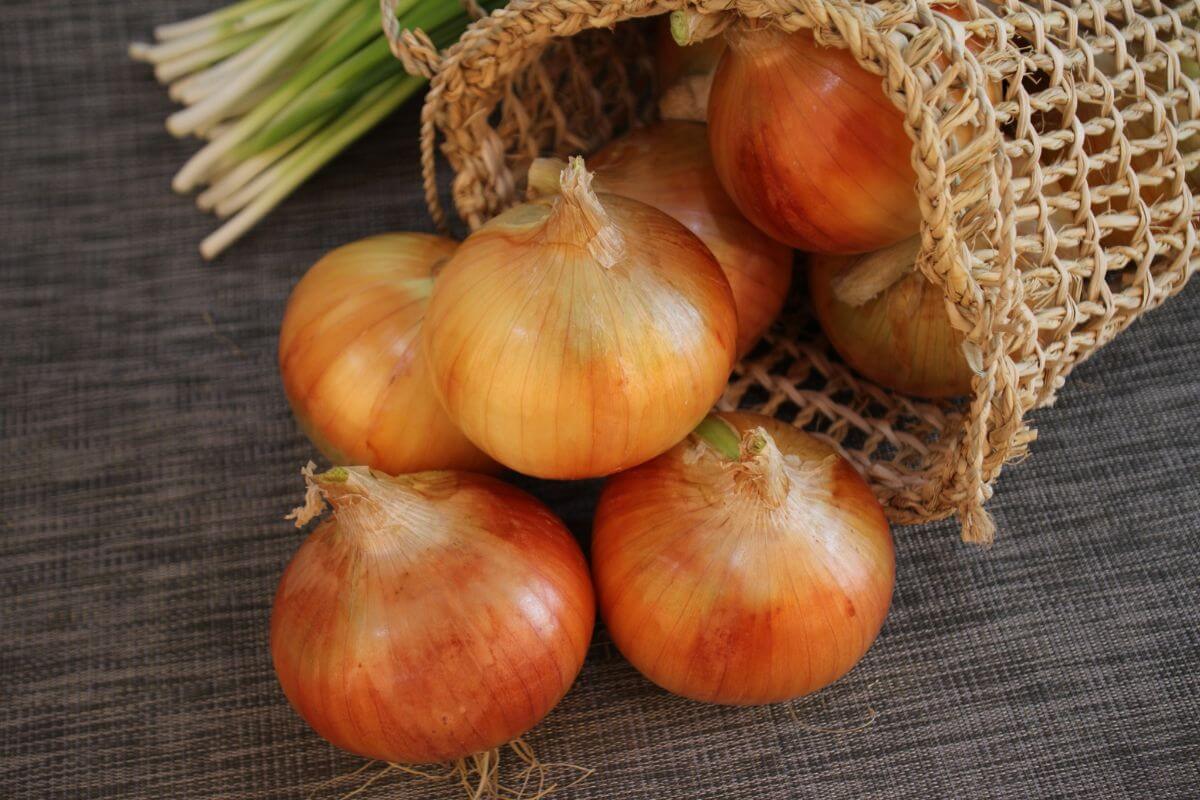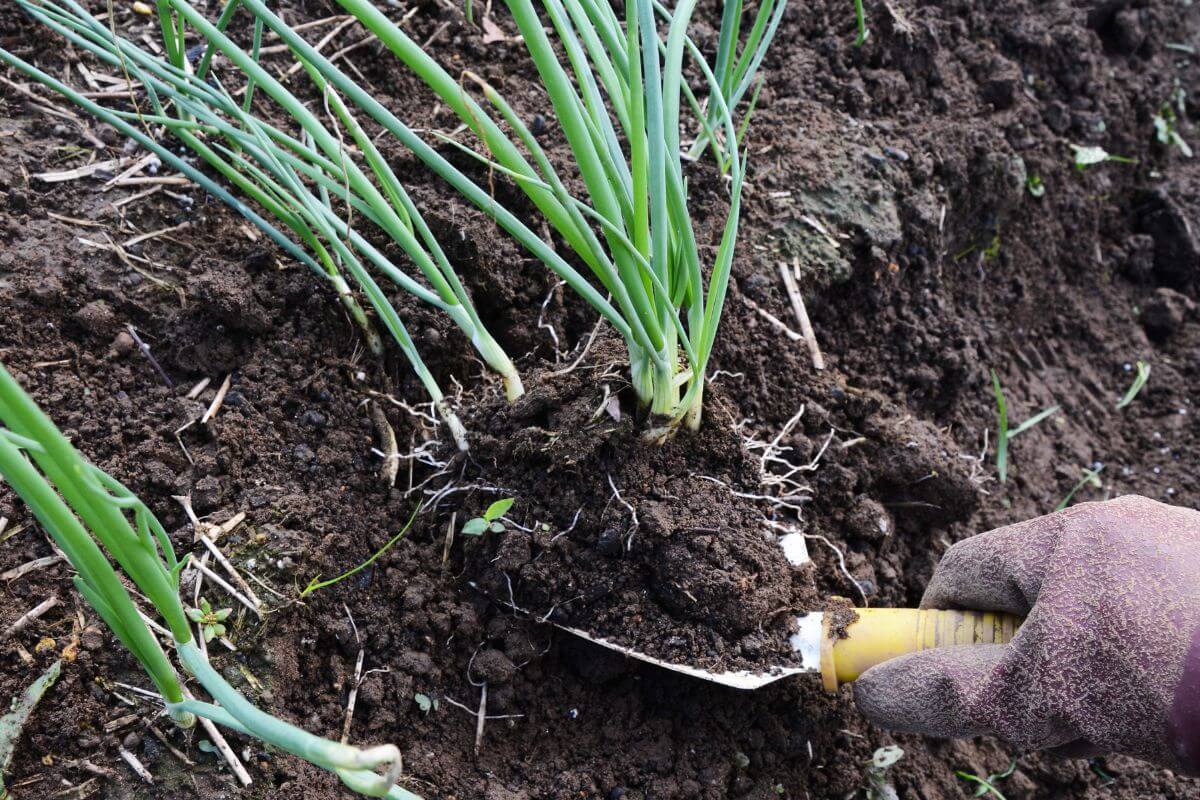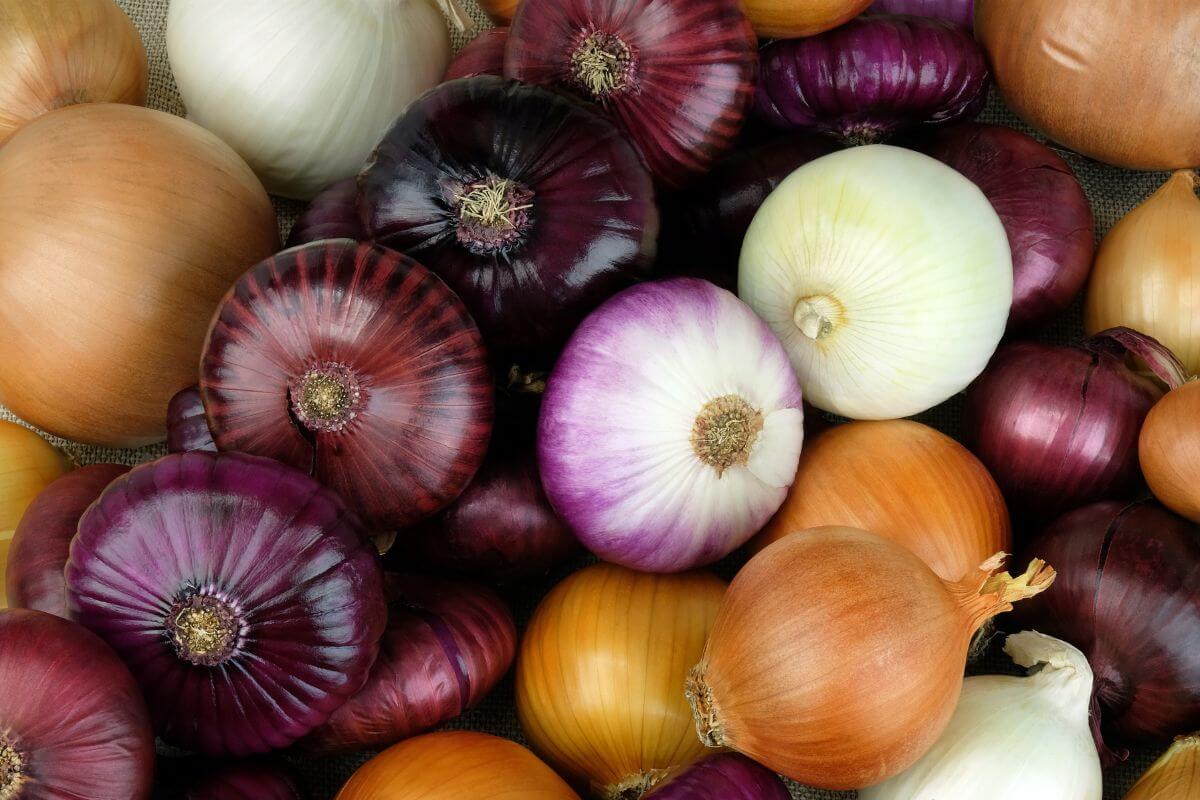Have you ever found yourself wondering, “Are onions vegetables or fruits?” It’s a common question that might pop up when you’re chopping onions for dinner. Let’s settle this once and for all.
Onions are indeed vegetables. They grow from bulbs and are used in savory dishes, unlike fruits that develop from flowers and are often sweet. But why is there confusion? I’ll explore the botanical and culinary reasons behind this debate.
Curious to know more? Dive in to discover why onions are classified as vegetables and learn some fascinating facts about these kitchen staples.
- Related article: How Is a Vegetable Different From a Fruit?
4 Key Takeaways on Are Onions Vegetables
- Onions grow from bulbs, not flowers. This makes them vegetables. You use them in cooking like other veggies, mostly in savory dishes.
- Spring onions are milder than regular onions. You can eat them whole, including the green tops. They add a crunchy texture to salads.
- Onions reproduce asexually. They grow from bulbs planted in the soil. They can also produce flower seeds, but bulbs are the main method.
- Onions come in many types, each with unique traits and uses. These varieties cater to different culinary needs.
Is an Onion a Vegetable?

Onions are veggies, plain and simple. I’ve grown them in my garden for years. They’re not like apples or oranges that grow from flowers. Nope, onions come from the bulb part of the plant. That’s why we call them veggies.
When you’re cooking, you use onions just like other veggies. You chop them up and toss them in your pan to make your food taste great. Have you ever tried caramelizing onions? It’s amazing how sweet they get!
Here’s a quick comparison of onions and fruits:
- Onions – Grow from bulbs, used in savory dishes
- Fruits – Grow from flowers, often sweet and used in desserts
Spring onions are like the baby cousins of regular onions. They’re milder and you can eat the whole thing – bulb and green tops. I love adding them to salads for a nice crunch.
Is an Onion a Fruit?
No, an onion is not a fruit. Fruits come from the ovaries of flowering plants and carry seeds.
Onions grow underground. They don’t have seeds and don’t come from a flower. Here are the four reasons why onions aren’t fruits:
- Botanically, onions are vegetables. The edible part is the bulb that develops from the stem. Fruits, however, develop from the ovary of a flowering plant.
- Culinarily, onions are used as vegetables. They are in savory dishes, often as a base flavor or ingredient, not in sweet dishes like fruits.
- Nutritionally, onions are more like other vegetables. They are low in natural sugars and high in vitamins, minerals, and fiber, which are typical of vegetables.
- Onions contain sulfur-rich volatile oils that give them a pungent flavor. This pungency is a vegetable trait, unlike the sweetness of fruits.
How Do Onions Reproduce?
Onion seeds come from the flower of the onion plant, known as an umbel. This flower has many small flowers grouped.
Each small flower has two petals. One petal is on top and one is below. When you look at the bottom half of each flower, you will see a small bumpy area with pollen.
This is where the male part of the flower is. Pollen is released when the onion plant’s stamens open during pollination season.
Onions can also grow from bulbs. These bulbs are planted in the soil. This lets them grow underground. Once they mature, the tops break off and you see the green skin underneath.
The green skin has layers of cells that protect the inside of the bulb. Inside this layer is another cell wall. Finally, the edible part of the onion is inside.
Onions are asexual vegetables. They can produce offspring without sexual reproduction. They store food, which helps new plants grow.
Bulbs store food and help new plants grow. This means onions can grow without seeds.
Tips for Growing Onions

Growing your own onions at home can be rewarding. Here are some tips to help you succeed:
- Make sure your onions get enough sunlight. They need lots of light but not direct sunlight. Place them in a sheltered spot near a window.
- Use mulch to help your onions grow. Peat moss or coconut husks work well.
- If you’re growing onions outdoors, use pots on the windowsill to get good light. Avoid direct sunlight. If it gets too hot by the window, keep them some distance from it.
- Water your onions when the soil is almost dry. Water the pots at least once a month. For soil in a bottle, water first, then water the onions, and place in the sun. Repeat when the soil dries out.
- Clay pots are better than plastic ones for growing onions.
- Use gravel as a smooth surface for roots.
By following these tips, you can enjoy fresh, home-grown onions.
What Are the Different Onion Varieties?

Onions are part of the allium family. There are a variety of onions you can use for different purposes. These include sweet white onions, red onions, yellow onions, shallots, scallions, leeks, garlic chives, and pearl onions.
Each type of onion has unique traits that make it good for specific uses.
- Sweet Onion – Sweet onions taste sweet without the sharp bite we often expect from onions. Vidalia and Walla Walla are the most common kinds. You can often find sweet white onions in supermarkets.
- Red Onion – Red onions are usually smaller. Their color comes from anthocyanin pigments. They taste sweeter than other onions. Red onions are great in salads.
- Yellow Onion – These are the most common onion bulbs for cooking. Yellow onions come in small and medium sizes. Small ones are sweeter. Medium yellows are great for cooking.
- Shallot – Shallots look like regular onions but are thinner and shorter. They are mostly grown in Asia and Europe. Shallow-fried shallots are popular in Chinese dishes.
- Leek – Leeks are one of the oldest vegetables. They started in China over 5,000 years ago. Now, they are grown worldwide. This vegetable looks like a long green onion. Its leaves look like flat blades.
- Pearl Onion – Pearl onions are tiny bulbs related to leeks. They are perfect for garnishing food because you don’t need to peel them.
If you have a vegetable garden and extra room, you can grow multiple types of onions.
What Are the Health Benefits of Onions?
People eat onions for many reasons. Some love the taste. Others enjoy the health benefits. Here are a few reasons why:
1. Onions Support Skin Health

You might love eating onions because they can keep your skin healthy. They have nutrients that promote better-looking skin.
These nutrients are vitamin C, vitamin A, vitamin B6, potassium, folate, and vitamin E. Vitamin C and sulfur in onions may help brighten skin. They can also reduce dark spots and hyperpigmentation.
Onions have compounds like quercetin. Quercetin can help wounds heal and reduce scars.
Onion oil can deeply moisturize and nourish your skin. It leaves your skin soft and supple.
Onion extracts have antibacterial and antiseptic properties. They can fight bacteria that cause skin infections and acne.
These potential health benefits make onions a great addition to your diet.
2. Onions May Help Prevent Cancer
Eating onions can lower your risk of cancer. They are full of antioxidants like quercetin and sulfur compounds. These can block harmful agents and cause bad cells to die. Studies show that onions can cut down the risk of stomach, colon, esophageal, and breast cancer.
Onions fight oxidative stress and inflammation. Both are linked to cancer. They also have prebiotics like inulin and fructooligosaccharides. These help grow good gut bacteria and can prevent digestive cancers.
Lab studies found that onion compounds like onionin A stop cancer cells from growing and spreading. Experts say you should eat onions, especially the outer layers. These have more flavonoids and can help prevent different types of cancer.
3. Onions Have Anti-Inflammatory Properties
Onions don’t just have powerful flavoring properties. They’re like little inflammation fighters in your kitchen.
When you get hurt or sick, your body sends in the troops to heal you. But sometimes these helpers can go overboard. That’s where onions step in to save the day. They calm things down and keep your body’s reaction in check. Pretty cool, right?
I’ve found that adding more onions to my meals has made a big difference. You might notice less swelling or pain if you eat them regularly. Why not try tossing some in your next stir-fry or salad? It’s an easy way to boost your health.
Here are some common types of onions you can use:
- Red onions
- Yellow onions
- White onions
- Sweet onions
- Purple onions
4. Onions Support Heart Health
Onions pack a punch when it comes to heart health. They’re loaded with good stuff that can help your ticker. Ever heard of quercetin? It’s a powerful antioxidant found in onions. This little superhero might just be your heart’s new best friend.
Here’s what quercetin in onions can do for you:
- Lower your cholesterol
- Bring down your blood pressure
- Cut the risk of blood clots
Onions also have these cool things called organosulfur compounds. They’re like tiny warriors in your body. They fight against blood clots and might even lower your chances of heart attacks and strokes.
5. Onions Support Bone Health
Did you know onions are great for bone support? These tasty veggies might be your secret weapon against bone loss. Research hints that onions could be a game-changer for older women worried about osteoporosis.
Want stronger bones? Try this: Gulp down some onion juice or munch on a whole onion daily. It sounds weird, but it works. You’ll improve bone density and toughness. Plus, you’ll ward off that pesky bad breath with all that onion goodness.
I’ve seen firsthand how adding onions to meals can make a difference. My aunt swears by her daily onion ritual. She’s in her 70s and still going strong. Coincidence? I think not!
6. Onions Support Digestive Health

Onions are loaded with prebiotics and fiber that your friendly gut bacteria love to munch on. When these bacteria break down the tough fiber in onions, they create short-chain fatty acids. These acids work wonders for your gut lining, making it stronger and healthier.
Did you know onions might help with irritable bowel syndrome? Some folks find relief by adding onions to their diet. But everyone’s different, so it’s best to chat with your doctor first.
7. Onions Have Antibacterial Properties
Did you know onions pack a powerful punch against harmful bacteria? It’s true! These kitchen staples contain special compounds that can put the brakes on nasty germs like E. coli and Salmonella. But that’s not all – onions are also loaded with antioxidants.
Here’s a fun fact: if you store onions for at least 3 months, their quercetin levels actually go up! So next time you’re chopping onions for dinner, remember you’re not just adding flavor. You’re also giving your body a boost of health-protecting goodness.
Why not try keeping a stash of onions in your pantry? It’s an easy way to always have these nutritional powerhouses on hand.
Different Ways to Add Onions to Your Diet

Onions are kitchen superstars! You can cook them in so many ways. I love to sauté, bake, boil, fry, grill, roast, steam, and stir-fry them. Sometimes I even munch on them raw.
These tasty bulbs have been around forever. Our ancestors used them long before we knew about vitamins and minerals. Today, onions are still a big deal in our meals.
We use onions to add flavor to all sorts of dishes. They’re great in soups, salads, sandwiches, and on pizzas. You’ll find them in dips, sauces, casseroles, appetizers, and main courses too.
Want to eat more onions? Try these ideas:
- Sip on onion water
- Whip up a hearty onion soup
- Enjoy raw onion as a zesty side dish
- Add diced onions to omelets, salads, and canned beans
- Make tangy pickled onions
- Create sweet caramelized onions
- Fry up some crispy onion rings
- Stuff whole onions for a fancy meal
Here’s how to make onion water:
1. Peel an onion
2. Slice it up
3. Boil in water for 4 minutes
4. Blend well
5. Drink up for a health boost
For a quick raw onion snack:
1. Slice an onion
2. Squeeze lime juice over it
3. Sprinkle with pink Himalayan salt
4. Enjoy as a side dish or toss in a salad
Onions are a great source of fiber. Cooked onions are easier to digest than raw ones. But both offer health perks.
I like to add onions to my meals in different ways. Sometimes I eat them raw. Other times I cook them up. Pickled onions are a fun change too. How about you? What’s your favorite way to enjoy onions?
Are Onions Vegetables or Fruits Final Thoughts
Onions are a must-have in your kitchen because they add flavor to both savory and sweet dishes. They are loaded with nutrients that boost bone, heart, and skin health.
Onions also have compounds that may help prevent cancer. If you want to make your meals tastier and healthier, be sure to add onions to your shopping list.
Are Onions Vegetables or Fruits FAQs
1. Do Onions Count Vegetables?
Yes, onions do count as vegetables, and they are often used in cooking and add flavor. They are considered flavoring and are often added to dishes like soups, stews, sandwiches, salads, etc.
2. Is an Onion a Vegetable or an Herb?
An onion is a vegetable, and it is part of the allium family. Onions are used for cooking, and they are also used to treat some health conditions. They are available year-round, and they grow well in cool climates.
3. What Is an Onion Categorized As?
An onion is classified as a vegetable and is also known as a bulb. Onions are grown underground and are often used for cooking. The onions come in many varieties, including sweet onions, red onions and white onions.
4. Do Vegetarians Eat Onions?
Yes, vegetarians do eat onions because onions are considered vegetables. Some people may avoid eating onions due to their strong smell or taste, but this does not mean that they cannot consume onions.
5. Are Onions Good for You?
Onions are healthy for you and offer several benefits, including helping to prevent cancer. They also contain vitamin C which helps fight infections. However, onion juice has been known to cause stomach upset, so be careful when consuming onions.
6. Is Onion a Root Vegetable?
Onion is a root vegetable, and it contains a lot of health benefits. It has been proven that onions help reduce cholesterol levels, prevent cancer, and fight diabetes. They also contain antioxidants that protect against heart disease.
Check out these other related articles:

